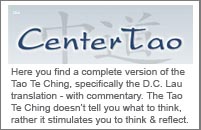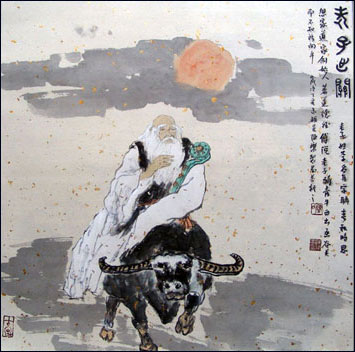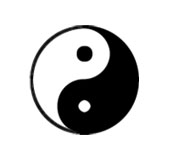I owe a
debt to
Lao
Tzu
and the
Tao
Te Ching,
this is obvious in my essay
WISDOM
... I
link to the Tao Te Ching in the right hand column of my home page:

From Wikipedia:
Laozi
(also Lao-Tzu, lit. "Old Master") was an ancient Chinese philosopher
and writer. He is known as the reputed author of the Tao Te Ching and the
founder of philosophical Taoism, and as a deity in religious Taoism and
traditional Chinese religions.
Although
a legendary figure, Laozi is usually dated to around the 6th century BCE and
reckoned a contemporary of Confucius, but some historians contend that he
actually lived during the Warring States period of the 5th or 4th century BCE.
A central figure in Chinese culture, Laozi is claimed by both the emperors of
the Tang dynasty and modern people of the Li surname as a founder of their
lineage. Laozi's work has been embraced by various anti-authoritarian movements
as well as Chinese legalism.
In the
mid-twentieth century, a consensus emerged among scholars that the historicity
of the person known as Laozi is doubtful and that the Tao Te Ching was "a
compilation" of Taoist sayings by many hands.

According to Chinese legend,
Laozi left China for the west on a water buffalo
Reminiscent of Confucius (who was a contemporary, it is believed the two had met [though it is not clear Lao Tzu was an individual]), there are just as many aphorisms ascribed Lao Tzu ...

Nothing is softer or more flexible than water, yet nothing can resist it;
be like water.
Knowing others is wisdom, knowing yourself is Enlightenment.
If you are depressed,
you're living in the past, if you're anxious, you are living in the
future, if you are at peace, you are living in the present.
Life is a series of natural and spontaneous changes. Don't resist them - that only creates sorrow. Let reality be reality. Let things flow naturally forward in whatever way they like.
If you do not change direction, you may end up where you are heading.
When the best leader's work is done the people say, 'We did it ourselves.'
Man's enemies are not demons, but human beings like himself.
He who controls others may be powerful, but he who has mastered himself is mightier still.
An ant on the move does more than a dozing ox.
I have just three things to teach: simplicity, patience, compassion. These three are your greatest treasures.
The key to growth is the introduction of higher dimensions of consciousness into our awareness.
All things in the world come from being. And being comes from non-being.
In dwelling, live close to the ground. In thinking, keep to the simple. In conflict, be fair and generous. In governing, don't try to control. In work, do what you enjoy. In family life, be completely present.
Mastering others is strength. Mastering yourself is true power.
He who conquers others is strong; He who conquers himself is mighty.
He who knows that enough is enough will always have enough.
Be content with what you have; rejoice in the way things are; when you realize there is nothing lacking, the whole world belongs to you.
The Way of Heaven does one good but never does one harm.
People in their handlings of affairs often fail when they are about to succeed. If one remains as careful at the end as he was at the beginning, there will be no failure.
Truthful words are not beautiful; beautiful words are not truthful.
Good words are not persuasive; persuasive words are not good.
Sincere words are not fine; fine words are not sincere.
He who knows, does not speak. He who speaks, does not know.
The sage does not hoard. The more he helps others, the more he benefits himself, The more he gives to others, the more he has himself. The Way of the sage is to act but not to compete.